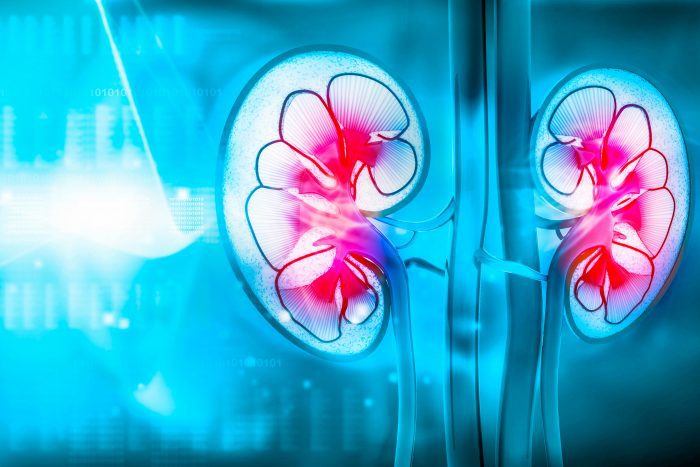Medical Compass: Do you have chronic kidney disease?
A daily quarter-teaspoon increase in sodium can affect kidney function
By David Dunaief, M.D

Approximately 37 million U.S. adults have chronic kidney disease (CKD), with as many as 9 in 10 not aware they have it, according to the CDC (1).
Early-stage CKD is associated with a 40 percent increased risk of developing cardiovascular events, such as heart attacks (2). It also significantly increases the risk of peripheral artery disease (PAD). Those with decreased kidney function have a 24 percent prevalence of PAD, compared to 3.7 percent in those with normal kidney function (3). Ultimately, it can progress to end-stage renal (kidney) disease, requiring dialysis and potentially a kidney transplant, so it’s important to identify and treat it.
However, one of the problems with early-stage CKD is that it tends to be asymptomatic. However, there are simple tests, such as a basic metabolic panel and a urinalysis, that will indicate whether you may have mild chronic kidney disease. These indices for kidney function include an estimated glomerular filtration rate (eGFR), creatinine level and protein in the urine. eGFR is a calculation, and while the other two indices have varying ranges depending on the laboratory used, a patient with an eGFR of 30 to 59 is considered to have mild disease. The eGFR and the kidney function are inversely related, meaning as eGFR declines, the severity of chronic kidney disease increases.
What can be done to stem early-stage CKD, before complications occur? There are several studies that have looked at medications and lifestyle modifications and their impacts on its prevention, treatment and reversal.
Does Allopurinol help?
Allopurinol is usually thought of as a medication to prevent gout.
However, in a randomized controlled trial with 113 patients, results show that allopurinol may help to slow the progression of CKD, defined in this study as an eGFR less than 60 (4). The group using 100 mg of allopurinol showed significant improvement in eGFR levels (compared to the control group) over a two-year period. The researchers concluded that allopurinol slowed CKD progression. Allopurinol also decreased cardiovascular risk by 71 percent.
A 2018 study published in the Journal of the American Medical Association, concluded that allopurinol at a dose of 300 mg or higher reduced the risk of developing stage 3 kidney disease, but less than 300 mg did not (5). However, there is a much smaller 2020 study that shows allopurinol does not help to slow the progression of CKD stage 3 patients (6). This study was very small, but it does raise a question about whether allopurinol truly works.
Diet’s impact
Fruits and vegetables may play a role in helping patients with CKD. In a one-year study with 77 patients, results showed that fruits and vegetables work as well as sodium bicarbonate in improving kidney function by reducing metabolic acidosis levels (7).
What is the significance of metabolic acidosis? It means that body fluids become acidic, and it is associated with chronic kidney disease. The authors concluded that both sodium bicarbonate and a diet including fruits and vegetables were renoprotective, helping to protect the kidneys from further damage in patients with CKD. Alkali diets are primarily plant-based, although not necessarily vegetarian or vegan. Animal products tend to cause an acidic environment.
In the Nurses’ Health Study, results show that animal fat, red meat and sodium all negatively impact kidney function (8). The risk of protein in the urine, a potential indicator of CKD, increased by 72 percent in those participants who consumed the highest amounts of animal fat compared to the lowest, and by 51 percent in those who ate red meat at least twice a week. With higher amounts of sodium, there was a 52 percent increased risk of having lower levels of eGFR.
The most interesting part with sodium was that the difference between higher mean consumption and the lower mean consumption was not that large, 2.4 grams compared to 1.7 grams. In other words, a difference of approximately a quarter-teaspoon of sodium was responsible for the decrease in kidney function.
In my practice, when CKD patients follow a vegetable-rich, nutrient-dense diet, there are substantial improvements in kidney functioning. For instance, for one patient, his baseline eGFR was 54. After one month of lifestyle modifications, his eGFR improved by 9 points to 63, which is a return to “normal” functioning of the kidney. Note that this is an anecdotal story and not a study.
Therefore, it is important to have your kidney function checked with mainstream tests. If the levels are low, you should address the issue through medications and lifestyle modifications to manage and reverse early-stage CKD. If you have common risk factors, such as diabetes, smoking, obesity or high blood pressure, or if you are over 60 years old, talk to your doctor about testing.
Don’t wait until symptoms and complications occur. In my experience, it is much easier to treat and reverse a disease in its earlier stages, and CKD is no exception.
References:
(1) CDC.gov. (2) N Engl J Med. 2004;351:1296-1305. (3) Circulation. 2004;109:320–323. (4) Clin J Am Soc Nephrol. 2010 Aug;5:1388-1393. (5) JAMA Intern Med. 2018;178(11):1526-1533. (6) N Engl J Med 2020; 382:2504-2513. (7) Clin J Am Soc Nephrol. 2013;8:371-381. (8) Clin J Am Soc Nephrol. 2010; 5:836-843.
Dr. David Dunaief is a speaker, author and local lifestyle medicine physician focusing on the integration of medicine, nutrition, fitness and stress management. For further information, visit www.medicalcompassmd.com.







